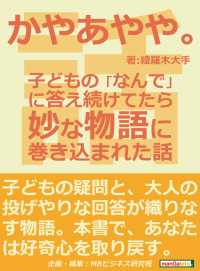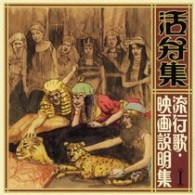- ホーム
- > 洋書
- > 英文書
- > Literary Criticism
基本説明
"Eric Santner's On Creaturely Life deserves a tribute, not a blurb. His intricate series of interlocutions between Rilke, Benjamin, Heidegger, Agamben, and Sebald make a kind of chamber music, rich with intellectual intuition and ethical clarity. Santner transforms and transposes the great themes of human and historical mediation in a range of keys - poetic, political, textual, juridical." ---Homi K. Bhabha.
Full Description
In his "Duino Elegies", Rainer Maria Rilke suggests that animals enjoy direct access to a realm of being - the open - concealed from humans by the workings of consciousness and self-consciousness. In his own reading of Rilke, Martin Heidegger reclaims the open as the proper domain of human existence, but suggests that human life remains haunted by vestiges of an animal-like relation to its surroundings. Walter Benjamin, in turn, was to show that such vestiges - what Eric Santner calls the creaturely - have a biopolitical aspect: they are linked to the processes that inscribe life in the realm of power and authority. Santner traces this theme of creaturely life from its poetic and philosophical beginnings in the first half of the twentieth century to the writings of the enigmatic German novelist W. G. Sebald. Sebald's entire oeuvre, Santner argues, can be seen as an archive of creaturely life. For Sebald, the work on such an archive was inseparable from his understanding of what it means to engage ethically with another person's history and pain, an engagement that transforms us from indifferent individuals into neighbors.
-

- 電子書籍
- ねこちゃんのヘンなとこ あたらしい絵本…
-

- 電子書籍
- 【フルカラー】私たちは性欲が我慢できな…
-

- 電子書籍
- XACAR 86&BRZ magazi…
-

- 電子書籍
- かやあやや。子どもの「なんで」に答え続…




